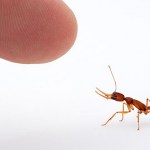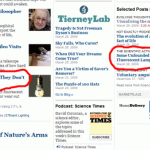blogosphere
One of the challenges we faced with our new blogosphere initiative, Silence is the Enemy, was how to mobilize people to do something about the plight of rape victims. It's not that people don't have empathy for rape victims; it's that the experience of living in a war-torn nation where rape and murder are routine facts of life is so foreign and horrifying to us, we tend to tune it out. Part of the way to deal with this is to give people a clear mission - something simple they can do; in our case, donating to Doctors without Borders (as I am for the month of June), or writing to Congress, or…
A sexual violence victim recovers in Goma, Congo
photo by Endre Vestvik
A few weeks ago, the NYT published a horrifying account by Nicholas Kristof of the pervasive sexual violence left over from Liberia's civil war. A major survey in Liberia found that 75% of Liberian women had been raped - most gang-raped. And many of the victims are children:
Of course, children are raped everywhere, but what is happening in Liberia is different. The war seems to have shattered norms and trained some men to think that when they want sex, they need simply to overpower a girl. Or at school, girls sometimes…
If you've been following the Jared Diamond/New Yorker controversy, or my ongoing posts on journalism vs. blogging (here, here, here, here, here), you might be intrigued by this conversation about the culture of fact-checking in journalism, between journalism professor Jay Rosen and programmer Dave Winer, in their podcast series Rebooting the News. Consider this riddle: how is fact-checking in journalism like (or unlike) debugging a computer program?
Here's Rosen's take on it:
One of the features of a rebooted news system would actually be borrowed from the tech world. And it's the notion of…
It is no secret that 3 Quarks Daily is one of my favorite blogs. It's the first blog I told my boyfriend to put on his Google Reader (he'd already added BioE, but still). Which is why I'm overjoyed to announce that 3QD has created its own prize for blogging. It's called a Quark. Oh, how I covet the Quark - especially the Strange Quark. And the finalists are to be judged by the 3QD editors and their guest judge . . . Stephen Pinker! w00t!
Any blog post on a natural or social science topic published since May 24, 2008 is eligible. The catch? Nominations are only open until midnight on June 1.…
This week, Nieman Journalism Lab is running a fascinating series of video interviews with the New York Times' R&D group on the possible future face of news media. I know - you're wondering why the supposedly financially moribund NYT is wasting money on nerds who play with Kindles. Who do they think they are, Google? But it might be a good strategy after all.
As Fortune and the Columbia Journalism Review recently pointed out, with outlets all around them slashing premium content (like science), the NYT's best strategy may be to instead become increasingly "elite:"
Meanwhile, the company is…
Over at his Discover blog, Carl Zimmer has asked readers to help choose a cover for his new non-majors evolution textbook. If you have a good eye for design, as I'm sure many BioE readers do, go over and help him pick the most appealing cover!
It's a hard choice, as so many design choices are. I'll leave my vote until after the fold so I don't prejudice you.
Okay; so I like all of them, but don't *love* any of them. My problem with the orchid, which I think is the most elegant and subtle design, is that it doesn't say "evolution" to me. It says "botany." Then it says "yawn." The minute I…
Some Kansas State University geographers have come up with some interesting maps of the US that purport to show the national distribution of the seven deadly sins. Obviously they can't gauge "sinfulness" directly, so they're using proxy data - such as STD infection rate to measure lust (above).
It's a fun thought exercise to assess the pros and cons of the various methodologies for measuring each sin. Consider greed, which was (as described in the Las Vegas Sun) calculated by comparing average incomes with the total number of inhabitants living beneath the poverty line. How does that…
Although I've only written a bit about the recent outbreak of influenza A H1N1 (swine flu), I'd encourage you to take a look at this post by Kent Newsome that discusses where to find reliable information on this topic. This post is particularly nice, because it gives concrete examples of some of the useful things this blogger has learned from these various sources. Granted, most of the sources he discusses are affiliated with ScienceBlogs, but that shouldn't really be surprising, given that there has been so much quality blogging here recently on the topic of swine flu (particularly by…
How much more successful would Gravity's Rainbow have been if it were two paragraphs long and posted on a blog beneath a picture of scantily clad coeds? And why not add a Google search box?
Want to become a high-profile Twitter superstar? McSweeney's tells you exactly how. Maybe Google is making everyone stupid, but if so, the bar for a successful writer is now much lower! w00t!
We all know Twitter can be annoying, but is it really evil? During the past week, you may have heard that there is brand-new neuroscientific evidence proving exactly that. But the hype turns out to be just that: hype.
It all started with a press release from USC about an upcoming PNAS paper by Mary Helen Immordino-Yang and Antonio Damasio, entitled "Neural Correlates of Admiration and Compassion." The USC press release, which was picked up by EurekAlert and other outlets, says:
The finding, contained in one of the first brain studies of inspirational emotions in a field dominated by a focus…
C.P. Snow fans, prepare to head over to the Intersection to partake in an upcoming online discussion of Snow's famous "Two Cultures" address. In their new article, "The Culture Crosser," Sheril and Chris portray Snow as a sort of science policy prophet:
It helps to think of Snow as an early theorist on a critical modern problem: How can we best translate highly complex information, stored in the minds of often eccentric (if well meaning) scientists, into the process of political decision making at all levels and in all aspects of government, from military to medical? At best that's a…
If you enjoy bioephemera, you should take a moment to check out Scienceblogs' new blog, Photo Synthesis:
While doing our usual browsing of the blogosphere, we've become aware of the vast number of excellent blogs featuring science imagery, from neural networks captured with a light microscope to images of supernovae billions of light-years away. To take advantage of this wealth of visual content, we've decided to host our favorites here on ScienceBlogs, with a rotating line-up of photobloggers we'll select monthly.
This month, Alex Wild of myrmecos kicks things off with his insect…
Here's one perspective on why journalism training is a bad idea:
I like to joke that I'm "unqualified" to do my job. But I think it was precisely that total lack of journalism training that gave me an edge. I never worked the cops-and-courts beat. I don't know how to write an inverted pyramid story or even really what that is. I do know how to write for different platforms, be scrappy and break news. I've had zero important alum connections and never got an internship at a big daily. And, in hindsight, that's probably the greatest stroke of luck I could have had. Journalism schools are like…
Last night, I dreamed that I had a closet full of seriously amazing shoes, from strappy stilettos to lace-up boots. When I awoke and remembered that my closet is actually full of uncomfortable work pumps and trail runners, I was disappointed. But I knew who to blame for my dream: Isis!
Ever since Isis arrived at Scienceblogs, I've been meaning to post something about shoes. When our resident domestic and laboratory goddess saved me a couple hours of driving to and from the office on Saturday by emailing me a journal article I'd forgotten, I promised to write her a thank-you post all about…
There are two interdisciplinary science meetings coming up that you should consider attending, in NYC and DC. Strangely enough, the ubiquitous Chris Mooney is speaking at both of them. Hmmm.
From April 30-May 1 in DC will be the AAAS Forum on Science and Technology Policy, which is a somewhat wonky look at federal science policy and government affairs. The agenda highlight? A plenary session on the future of science journalism, to which I'm looking forward with both enthusiasm and curiosity, given the wide range of opinions on the blogosphere. I'm sure there will also be lots of discussion…
Scibling Bora has expressed his wish "to end once for all the entire genre of discussing the "bloggers vs. journalists" trope," and tried to do so with perhaps the most massive science-journalism-Web2.0 post evah.
Bora says,
the whole "bloggers will replace journalists" trope is silly and wrong. No, journalists will replace journalists. It's just that there will be fewer of them paid, and more of us unpaid. Some will be ex-newspapermen, others ex-bloggers, but both will be journalists. Instead of on paper, journalism will happen online. Instead of massaging your article to fit into two inches…
What are the relative strengths and weaknesses of long-form, slow-bake, "mainstream" journalism and the idiom we call the blogosphere? As per Bora, the meaning of these terms are shifting as we speak. Last night, using my recent story and blogging on PTSD as a point of focus, I put in my latest two cents on this subject at my talk -- actually a long conversation with host and audience -- at the NYU Science, Health and Environmental Program's "Inside-Out" lecture series.
This was a crowd of writers, journalism profs, and journalism students, and I think we were all surprised at how many…
Although people who know me can attest that I made countless assurances that I would never do such a thing, I have once again succumbed to the relentless force of progress, and I'm now on Twitter. Check me out. I'm actually finding it quite useful, and I'm currently using my feed to provide updates on new blog posts, to pass along interesting links I won't get around to blogging, to give other random thoughts, and to interact with my online network in general. I've put a widget on the sidebar of my blog, but if you're interested you can also follow my Twitter feed to stay up to date on all…
Continuing the current discussion of the questionable quality of popular science journalism, British researcher Simon Baron-Cohen weighs in at the New Scientist with his personal experiences of misrepresented research. Baron-Cohen complains that earlier this year, several articles on his work linking prenatal testosterone levels to autistic traits, including coverage in the Guardian, were titled and subtitled misleadingly:
It has left me wondering: who are the headline writers? Articles and columns in newspapers are bylined so there is some accountability when they get things wrong. In this…
From The New York Times science page:
Click here for a larger image and here for context.




